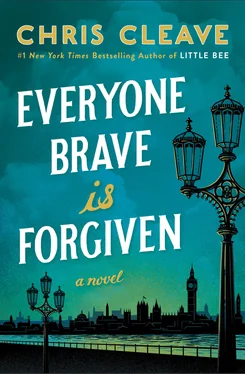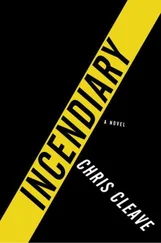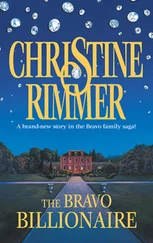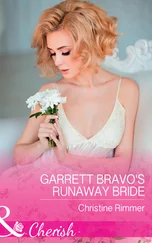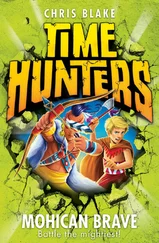Alistair was weakening too. From the darkness before them came strange colored flashes, which might have been real or might not. Fragments of songs and advertising slogans played in his ears, so clear that it was hard to believe he was not hearing them. Brylcreem your hair — she likes it that way. He shook his head to clear it. Lovely day for a Guinness. He forced himself back into the reality of it: wind on his left cheek, guiding Duggan over the worst of the uneven ground. For a while it worked. He raised one boot, then the other, then one boot, then the other, then They’re jolly well taking daily Bovril .
A gust caught him in the face and snapped him awake. He found himself motionless, with Duggan leaning against him. He didn’t know how long the two of them had been standing like that, asleep on their feet. He shook Duggan alert and called a rest, and the two of them ducked into the poor shelter of a hillock that they sensed rather than saw. They put their backs to the slight slope and drew up their knees. Now that they had stopped, the cold was frightening.
“Duggan?”
There was no answer.
Alistair shook him. “Duggan! We can’t sleep. We’ll fall unconscious.”
A short pause. “Well, that would nuh… never do. What would the suh… sergeant major do without us?”
“He’d probably be court-martialed for leaving us out here.”
“Then I’m temped to die just to spuh… spite him.”
“That’s the spirit that will win us the war.”
“How fuh… far now, do you think?”
Alistair thought about it. His best guess was that the company had been six or seven miles east of barracks when the truck had come. He was reasonably sure that the two of them had walked in the right direction, but it was impossible to know at what rate. At times they had hardly made progress at all. He supposed they had traveled two or three miles in as many hours, and they had between three and five more miles still to go.
“Not long at all now,” he said. “Another hour should do it.”
“Juh… jolly good,” said Duggan. “I have more of those buh… biscuits back at buh… barracks, you know.”
“Fine,” said Alistair. “That will be just the ticket.”
“Stuh… steady on, old boy. I never suh… said I would share them.”
Alistair grinned, feeling the stretch in his numb cheeks for the first time in hours. He stood with difficulty, shouldered his pack and rifle, then felt for Duggan’s hand to pull him up to his feet.
“Come on, you old dog, let’s get you back to your kennel.”
They set out into the gale again, struggling forward with heavy boots.
Now, at last, came the longed-for hint of dawn. It came slowly, this restitution of shape to the world. With the cloud so thick and the sun still below the horizon it did not seem that the light came from any one origin but rather that the near tussocks and the distant berms and their own outstretched hands all glowed, each with their own pale effusion. It seemed like something holy. Even the wind relented and began to drop with the dawn. The rain slowed to a drizzle and the venom went out of it.
In the feeble light they came across parallel tracks with freshly cut tire marks in the wet sedge. Now they had only to follow the truck home. Both men understood then that they were saved. They looked at each other and smiled shyly, knowing that they would make it now, and that their friendship formed in the darkness would carry on into the light.
Duggan found his strength again. He no longer needed to hang on to Alistair’s shoulder, and they walked side by side and made quicker progress into the west. The rain stopped entirely and the wind dropped. The base of the cloud began to rise. From beneath the earth the sun came up, red and ancient, contracting and brightening as it rose at their backs. Their long shadows preceded them across the plain.
“My buh… boots are killing me,” said Duggan with a grin. “I miss cuh… comfy shoes. Are you for Chelseas or pumps?”
“I’m a loafer who favors a brogue.”
“I like a guh… good heel on a shoe and I don’t care for those fuh… fussy leathers like pigskin or cuh…calfskin. Just give me something that can tuh… take a decent shine. I don’t mind as far as the cuh… color goes. Black is all right, I suppose, but tan is fine tuh… too and even a beige or—” He stepped on the unexploded artillery shell, and it tore him apart.
AT THE BARRACKS ALISTAIR kept returning to awareness to find himself engaged in some activity: showering, or shaving, or eating green soup and white rolls in the NAAFI. Men of all ranks came and talked at him soundlessly, and from their demeanor he tried to gauge which were offering consolation and which were giving orders. Officers seemed to be waiting for him to say something. He tried “sir,” but it didn’t make them leave him alone.
The explosion had deafened him. At dinner a single drop of blood splashed to the table beside his bowl and he stared until he understood that it had come from him. With his finger he traced its point of origin to his ear. Embarrassed, he left the table with his food untouched.
Alone in the dormitory, with his hearing beginning to return, he opened his locker. There was to be a kit inspection at dawn — there always was — and his equipment was a state. He balled up newspaper, stuffed it into his boots and stood them on the paraffin heater. It was against regulations, and Alistair knew that if the sergeant major saw it, then he would say: “THE REGULATIONS ARE THERE FOR A REASON. WHAT IF EVERYONE PUT THEIR BOOTS TO DRY ON TOP OF THIS PARAFFIN HEATER?” And Alistair, along with the other men present, would be required to suppress the answering voice that said: “Everyone would have dry boots.”
Alistair folded his two dress shirts into regulation rectangles and squared them away in the top left position in the locker, with the collar side at the back and the forward edge parallel to the edge of the metal shelf and one exact quarter-inch back from it. Some fellow sufferer in history had scored a line into the metal shelf of the locker, to facilitate the alignment. This was the only humanizing decoration that Alistair had found in the barracks. In the caves of Lascaux he had seen aurochs and megaloceros daubed in mineral paint. In the restoration rooms of the Tate he had held his breath over Turner’s brushwork.
He took off his trousers to fold them, and found an envelope in a pocket. The post had come during the day, clearly, and he must have lined up with the other men to receive it. There had been so many lines that day. Armory, brigadier’s office, laundry, infirmary. He had handed in his rifle, his report, his clothes, his body, until there was nothing left to surrender and he had been dismissed to light duties.
He opened the letter.
Dear Alistair,
I, Caesar, have been keeping an eye on Tom for you — or rather, I have been keeping a rather fetching mother-of-pearl coat button on him, since that was what you saw fit to equip me with. I have much to report, so pin back your ears. (After all, you did pin back mine.)
Since you left for pastures more exciting, your flatmate has seen his own existence considerably enlivened. You know that I disapprove of humans and their laughable choices of mate, but in this case even I must admit that your friend Tom has picked a corker. Mary North is the loveliest thing I have ever seen, despite her damnable lack of tail and whiskers, and her strange habit of walking on her hind legs.
Alistair put down the letter and went over to the paraffin stove. His boots steamed. He turned them to let the heel sides dry, and pulled out the tongues. He eyed the boots critically. It would be important to take them off the stove before they were absolutely crisp, or else the leather would ossify. Then he would get blisters on the next march — and the company didn’t slow for blisters. You marched until they burst, and then until the flesh rubbed raw. Blisters were the true reason the men hated the enemy. The invasion of Poland was terrible, of course, but at least it was an event that had taken place on the outside of everyone’s boots.
Читать дальше
